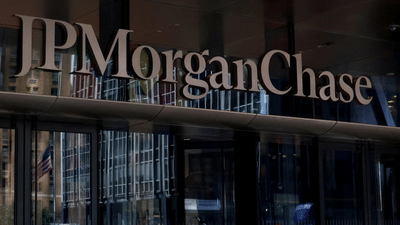JPMorgan Chase launches $1.5 trillion plan: US critical industries in focus; aims to cut supply chain risks
JPMorgan Chase on Monday unveiled a $1.5 trillion plan to bolster key US industries, including rare minerals, shipbuilding, and nuclear energy, in a move it described as critical for national security and economic resilience .
The US banking giant, which manages assets of about $3.8 trillion, said it would deploy direct equity and venture capital investments of up to $10 billion in select companies. It also plans to facilitate funding for projects deemed essential to the nation’s economic security, according to an announcement on its website, AFP reported.

CEO Jamie Dimon framed the initiative as a response to growing global uncertainties. In a Wall Street Journal op-ed, Dimon cited conflicts in Ukraine and other international hotspots as evidence that “the world is far from safe” and warned that US dependence on external sources for critical minerals and manufacturing could threaten national security.
“The US has allowed itself to become too reliant on unreliable sources of critical minerals, products, and manufacturing — all of which are essential for our national security,” Dimon wrote. “Our adversaries and potential adversaries aren’t waiting — we no longer have the luxury of time.”
The plan spans JPMorgan’s investment and commercial banking arms, and will include efforts to support research and development, streamline permitting, and navigate regulatory hurdles. Priority sectors include defense and aerospace, energy independence, and supply chain resilience. The initiative also identifies 27 sub-areas such as AI, where the US leads globally, alongside sectors like shipbuilding where the country lags (AFP).
Supply chain weaknesses became especially visible during the Covid-19 pandemic, when semiconductor shortages disrupted auto manufacturing and other industries. To address such vulnerabilities, Congress passed the CHIPS and Science Act in 2022, authorising $280 billion to strengthen domestic production, the bank noted.
The initiative comes amid heightened focus on critical materials under the Trump administration, which has taken stakes in private companies such as Intel and MP Materials, a departure from traditional US free-market practices. Tensions over control of critical minerals have also added strain to US-China relations, with both countries competing in strategic areas including artificial intelligence
The US banking giant, which manages assets of about $3.8 trillion, said it would deploy direct equity and venture capital investments of up to $10 billion in select companies. It also plans to facilitate funding for projects deemed essential to the nation’s economic security, according to an announcement on its website, AFP reported.
CEO Jamie Dimon framed the initiative as a response to growing global uncertainties. In a Wall Street Journal op-ed, Dimon cited conflicts in Ukraine and other international hotspots as evidence that “the world is far from safe” and warned that US dependence on external sources for critical minerals and manufacturing could threaten national security.
“The US has allowed itself to become too reliant on unreliable sources of critical minerals, products, and manufacturing — all of which are essential for our national security,” Dimon wrote. “Our adversaries and potential adversaries aren’t waiting — we no longer have the luxury of time.”
The plan spans JPMorgan’s investment and commercial banking arms, and will include efforts to support research and development, streamline permitting, and navigate regulatory hurdles. Priority sectors include defense and aerospace, energy independence, and supply chain resilience. The initiative also identifies 27 sub-areas such as AI, where the US leads globally, alongside sectors like shipbuilding where the country lags (AFP).
Supply chain weaknesses became especially visible during the Covid-19 pandemic, when semiconductor shortages disrupted auto manufacturing and other industries. To address such vulnerabilities, Congress passed the CHIPS and Science Act in 2022, authorising $280 billion to strengthen domestic production, the bank noted.
The initiative comes amid heightened focus on critical materials under the Trump administration, which has taken stakes in private companies such as Intel and MP Materials, a departure from traditional US free-market practices. Tensions over control of critical minerals have also added strain to US-China relations, with both countries competing in strategic areas including artificial intelligence
Next Story